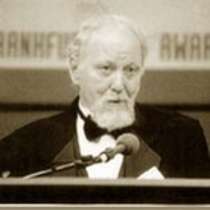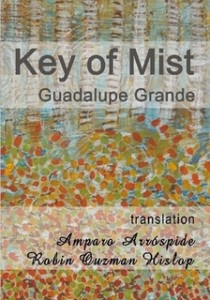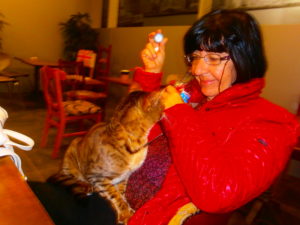Africa North Solstice winds, rain return in spells a moon waxes full, dogs howl as well. All the babble of the Souk men over there, over there women. All the life of the planet so little part of it that I breathe. Weather beaten highlands, once passed through. The river bed, no more like a parched bone its late autumnal river meanders as a vein past four reservoirs a quest that will end in winter´s flood. Between them are momentary mists where brightly clad figures of the north, suddenly dim. On the frontier’s beach taxis come, go only the stranded remain, together with the seagulls four men huddled, drenched in pouring rain dead once more, again, all pathways home washed away, again. A broken song remember me, sung in a doorway brings the world at large together as suddenly as it narrows. Water runs on marble nakedness revealed, nakedness concealed form water words, water memories, mists, fates. Veins wrestle the marble into mangled knots blemished pearls on an implacable skin shards leaving fragmentary traces empty spaces awaiting faces. Lights dance in the night, picturesque “casas blancas del pueblo” appear through the darkness as the brush strokes of my mind steal the action of the shadow. Mists cordon the mountain tops guerdoned crowns like wreathes. Ancient fields' still colours surrounded by burgeoning new lead to the valley below. Old women , old as aglow, so slow they go poised aloof in an untouchable world, trapped. High in kiln firelight they cowl night’s shade to oversee goats on the hill beneath. Daughters of necessity naked in the rock unleashed in white trefoil in the marsh swamp of night rain, stark where epochs sleep in their shadows replication of memories, where the old becomes the new, a world splits in two with Morpheus in the breach. Beyond control, beyond reach the erratic butterfly flits bloom to bloom, the intrepid stalker with net both captured in the mimic mould. A knot is tied, a knot that wrestles embraces, that ravels birth unravels death & binds its existence. Her face is as if a moon glazed over with a less serene ceramic dust that in the end after its perplexity contains its surety. She draws her forefinger laterally across under her eye lid in a smear nor can you change the image of what you are in the pupil of her eye. Babble bodies blur voices with their echoes down the street sky high, prices fly a bird song breaks, a splash charade Faces in the rain thin weakness of watery years. A winnowing canvass tosses corn as fireflies in the blazing day. The hag in her rags begs her bag holding all shadows to account. You sit in the solitary corner at the empty dice board to throw, as the music swells, as strings play. On the washing line clothes of all shapes sizes are waiting to be filled suspended between earth, sky, where white sheets blow. A twinge of nostalgia flashes a link between a fluttering curtain an open window frame, a sun shadow game a flickering apparition pattern leaving only - strands. A breeze flutters an open foolscap on the table as though a phantom reader should flick with regard through a score of notes then stops at the first blank white sheets stays, the moving hand that wrote, wrote no more. On record, old honky-tonk goes on amidst the heaps of consumer city sneakers in the same dust where faces turn from their spring red lustre to a sun soiled wear through a beehive of allies names, aye to fetch them home again as if where the countless dead resided, you’d said in a market of women shrouded in shawls. Berlin falls, Baghdad falls all the years turn to further tears further fears to merge with your voyage the shape of dreams to come to be only endearments of what has gone before. A flower opens after a thousand years in a shell of tears indifferent to its beholders’ sight who paint it with the colours from the waters of their night on an unknown shore, to whose sight it opened once before. Children’s faces like radiant imps play carefree in the streets below overhead on red tiles, fat pigeons bicker, coo. In an internet cafe, an Arab girl discrete in headdress plays with cartoon molecules of Micky Mouse Kola bear nubile women’s faces dream of nudity in their shrouds. Wonky pinz nez specs, jumble sale clothes bad teeth, unshaven grin looking a faded duplicate of a down out James Joyce with the come on are you Irish, he asks perhaps he was once upon a time. They came through the cleft of the mountain - where the river ran to swim as a blur in the naked purple of the eye on the mountain face there is a scar once a sacred place, now extinct, as they are. Yet wild still she runs, amidst the sheep, goats toils at the hearth, dutifully bears children yesterday she knows but not tomorrow where she hides her sorrow even as he ploughs the hillside a photo will steal his soul, but his beasts will do. Twilight’s girls, girls, girls throng the bustling street corners eating caracoles. By day the olive tree green in the blue sky of the window seems almost immortal enriched with the blood it’s enriched, now at its roots. Costa de la playa, white beehives in the sun, all money, no honey. In the broken lights of the bazaar the dusky eyes of the beggar sunk in their sockets maze in crooked cul de sacs embargo amidst the furls of silk that foil the flickering lantern niche. In the gloaming a solitary reaper reaps its shadow. Streets packs ravage carcasses at dawn, the city wakes to the city’s obedience to obey its disappearing shadows. A ghost city of watchers watched as shadows by a memory that has outlived them now fragments in an admixture of old, new - amidst a junk yard of rubble watcher shadows phased captive to their fading stories. The street’s mechanics of the day obey their limits, patterns of parts where we end only to start in a series of nows post mortem of the world at large an autopsy of ghosts on the slab. Born to see, in the boutiques people seem like their own mannequins existence is a mystery with no purpose only we endow it with a destiny, it does not seek from us.
All the Babble of the Souk.amazon.com
Robin Ouzman Hislop is Editor of Poetry Life and Times ; at Artvilla.com
You may visit Aquillrelle.com/Author Robin Ouzman Hislop about author.
See Robin performing his work Performance (University of Leeds)









